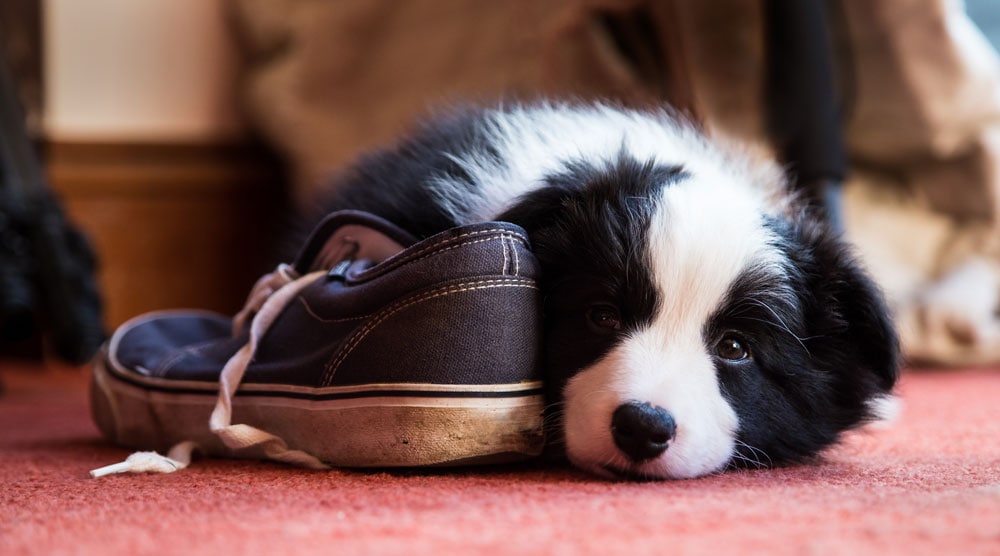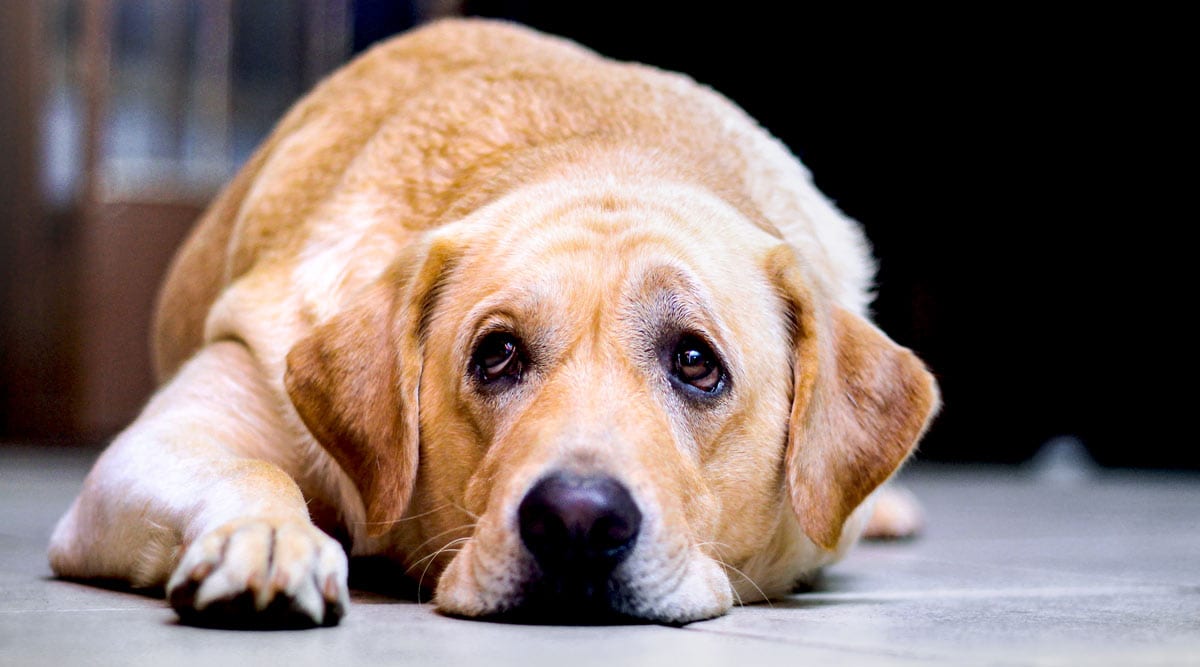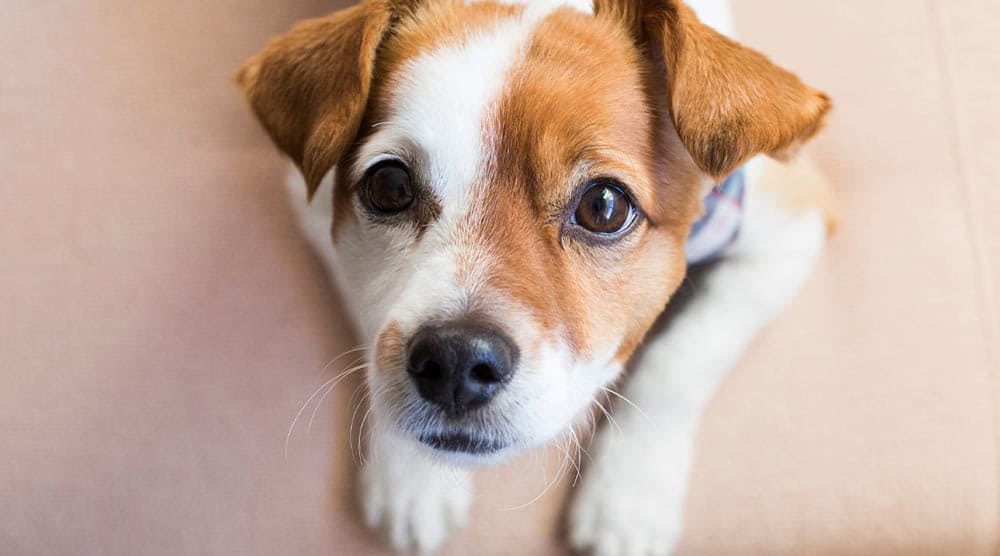Is your dog licking the floor? Dogs rely on their sense of smell and taste to explore the world. So, floor or carpet licking isn’t always something to worry about.
In fact, a dog occasionally licking the floor is normal canine behaviour – especially if food has been spilt!
However, ongoing, frantic, or excessive floor licking can be a symptom of a medical or behavioural issue. It’s sometimes called excessive licking of surfaces (ELS) and isn’t something you should ignore.
Let’s take a closer look at what can cause excessive floor licking and when you should be concerned.
Contents
6 Reasons Why Your Dog Licks The Floor Or Carpet
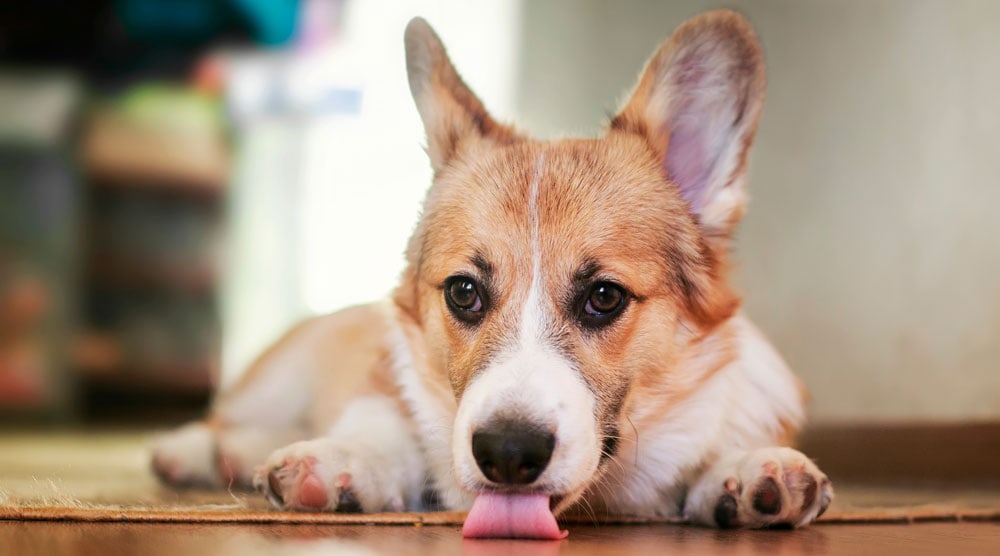
A dog licking the floor can be caused by medical, behavioural, or environmental issues. Each has a different solution, so it’s important to understand why your dog is licking the floor before you attempt to fix the problem.
Start by getting a vet checkup to rule out medical problems. If possible, bring a video recording of the licking so your vet can see exactly what’s happening. A diary of when the licking happens, along with what the dog has eaten and any recent changes to the environment, can also help.
If there’s no medical reason for a dog licking the floor, then the problem is likely to be behavioural. Some behaviour issues can be simple to solve, but compulsive disorders should always be addressed with the help of a qualified behaviourist.
1. Nausea And Other Gastrointestinal Issues
Gastrointestinal issues are probably the most common reason for excessive licking. While it’s not fully established why dogs with GI issues lick the floor or other objects, it’s thought to be an attempt to relieve nausea or discomfort.
This is backed up by a small study in 2009, which showed the majority of dogs with excessive licking issues also had gastrointestinal disorders.
The study only looked at 19 dogs with ELS (and a control group with 10 dogs), but 14 of these were diagnosed with GI issues. Examples include pancreatitis, giardiasis, irritable bowel syndrome (IBS), and delayed gastric emptying.
For this reason, it’s important to take your dog to the vet if they are excessively licking the floor (or any other objects, such as blankets).
Along with a dog constantly licking, other symptoms of GI issues to watch out for include:
- Drooling
- Retching
- Loss of appetite
- Dehydration
- Heaving
- Eating grass
The good news is that ELS typically resolves once the underlying GI condition has been treated.
2. Other Medical Issues
Aside from the GI issues mentioned above, other medical problems could cause excessive floor licking. Some examples include:
- Pica. This is a condition that causes a dog to compulsively eat non-food objects, such as socks, stones, or carpet fibres. Pica must be investigated by a vet, as it can be very dangerous for your dog to eat inedible objects.
- Acid Reflux. Acid reflux is a potential cause of nausea in dogs, especially if the dog licks the floor soon after eating.
- Empty Stomach. Sometimes dogs can feel nauseous when their stomachs are empty for long periods, leading to the dog licking the floor to get relief. This is most common overnight.
- Parasites. Intestinal parasites can cause feelings of discomfort or nausea, which may cause a dog to lick the floor to try and get relief. Symptoms often don’t show until the dog is severely infected, but can include vomiting, diarrhoea, scooting, weight loss, a dull coat, and lethargy.
- Compulsive Behaviour. Some dogs develop compulsive behaviours, which can include licking the air or other objects. It’s not known why these behaviours become compulsive, although some dogs are thought to be genetically predisposed to developing them.
As there are many medical conditions that can cause excessive licking, you should always take your dog for a vet checkup if you notice they are licking the floor more than normal.
3. Pain
Pain in the mouth, gums, or teeth can cause a dog to lick the floor.
Just like nausea, excessive licking behaviors can distract from the pain. But it may also be the dog’s attempt to get rid of excessive drool that often builds up when there are mouth issues.
Some common reasons for pain in the mouth include:
- Gum wounds (such as an injury caused by carrying a sharp stick)
- Object stuck in the mouth or throat
- Gum disease
- Fractured teeth
- Stomach ulcers
Pain in the mouth is nearly always accompanied by other symptoms. These include bad breath, difficulties chewing food or toys, and pawing at the mouth.
If you notice any of these symptoms, contact your vet immediately. The pain and licking won’t stop until the underlying condition is treated.
4. Stress or Anxiety
A stressed dog might lick the floor or air as a distraction from negative feelings.
This might seem strange, but a dog who feels trapped in a stressful situation often doesn’t have many options to gain relief. Doing something that’s even slightly distracting, such as licking, could potentially reduce their anxiety.
If you suspect your dog is licking the floor due to anxiety, it’s a good idea to start a written log. Record when the licking happens, along with the external circumstances. Also watch for other types of excessive licking, such as repeatedly licking their paws.
Look for patterns when licking behavior is more likely to happen, such as:
- Time of day (night, before you leave for work, after dinner etc)
- People or other animals in the house (including guests)
- Noises
- Other potential stress triggers (such as arguments or tension in the household)
You should also consider whether the dog’s environment has changed. Did you move house? Or is there a new member of the family? Any changes in your dog’s environment or routine could cause anxiety.
The best way to resolve anxiety is to remove the trigger. However, this isn’t always possible, especially if the trigger isn’t something you can control.
Some other options for reducing anxiety include:
- Reducing the intensity of the trigger. For example, if your dog often licks the floor when there are noises outside, you could play the radio or white noise to cover them up.
- Thundershirts. These are vests for dogs that apply gentle pressure across the body. They can sometimes relieve anxiety and fear.
- Adaptil. Adaptil releases pheromones into the air that can help keep a dog calm. The pheromones mimic those released by a puppy’s mother after she has given birth, but can still work for adult dogs.
- Mental stimulation. Giving your dog something else to focus on can reduce anxiety in mildly stressful situations. A tasty chew or a new toy can be great options. This probably won’t work when your dog is highly stressed or anxious though.
- Desensitisation training. Desensitisation training gradually teaches a dog to link positive feelings with a stress trigger. It can be a difficult process, so it’s best to perform desensitisation training with the help of a canine behaviourist.
You should also talk to a vet if your dog is experiencing chronic stress or anxiety. There are medications that can reduce stress, which may help to stop excessive licking.
Related Article: A Complete Guide to Stress In Dogs
5. Boredom Or Frustration
Boredom is often overlooked as a cause of unwanted canine behaviour. However, dogs who are bored or frustrated may develop repetitive behaviors such as excessive chewing, scratching, pacing, carpet digging, or floor licking.
The key to preventing boredom is to provide your dog with enough mental and physical stimulation. After all, while daily walks are important, you can’t expect a dog not to get bored if she’s left alone for the other 23 hours of the day.
Here are some tips for preventing boredom in dogs:
- Make sure your dog is getting the right amount of physical exercise. Speak to your vet if you’re not sure how much exercise your dog needs, as the amount varies depending on breed, age, and health.
- Allow your dog plenty of time to sniff when on a walk. Remember, this is your dog’s only chance to explore a different environment!
- Don’t leave your dog alone for long periods. This is one of the most common reasons for boredom and frustration. If you’re at work all day, make sure a family member or dog walker is visiting and will spend significant time with your pet.
- Use a slow feeder or puzzle feeder for your dog’s meals. For example, a snuffle mat activates your dog’s sense of smell and natural foraging instincts, which can be mentally stimulating.
- Practice your dog’s basic cues (such as sit, stay, and down) using positive reinforcement. Positive training is highly stimulating and mentally tiring for dogs.
- Play indoor games with your dog and make sure they always have access to interesting toys.
- Give your dog plenty of attention and love!

Is Floor Licking A Way To Get Attention?
Sometimes dogs learn that certain behaviours get attention from their owners. For example, if you call your dog over whenever he licks the floor, then he might be more likely to repeat this behaviour in the future.
However, it’s important to understand that a bored dog may perform these behaviours as a form of self-entertainment, regardless of whether they get attention.
An easy way to tell the difference is to watch when your dog licks the floor. If he only does it when you’re nearby, then it’s most likely attention seeking behaviour. If he does it even when you’re not in the same room, then it’s probably a way to relieve boredom.
So, if you think floor licking is due to attention seeking, avoid giving your dog attention (including negative) when it happens. Instead, ignore your dog’s floor licking and leave the room.
6. Spilt Food Or Drink
If your dog is licking the same spot repeatedly, then the answer could simply be that she’s found a tasty food spill!
Dogs have an exceptional sense of smell, so they can find old food that isn’t obvious to humans. They are also natural scavengers who won’t pass up the opportunity to lick anything that tastes nice.
Licking spilt food from a hard floor or carpet isn’t something to worry about, unless the food contains potentially dangerous ingredients. The licking usually won’t last long, so if your pet is continuously licking then it’s likely to be caused by one of the other issues on this list.
Other Symptoms Often Seen With Floor Licking
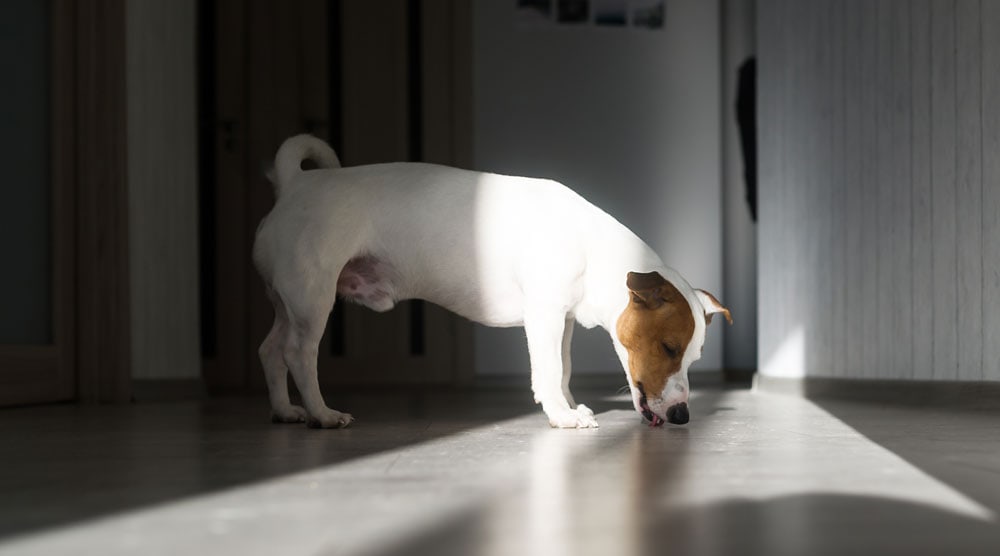
Vomiting And/Or Upset Stomach
Floor licking that’s combined with vomiting or an upset stomach is likely due to a gastrointestinal issue. You should contact your vet if the symptoms continue.
Keep in mind that a dog vomiting isn’t always a reason to be concerned though. For example, dogs can often make themselves sick by eating too fast, or snacking on something unpleasant during a walk. In these situations, they will often vomit once, then continue with their day.
However, if a dog vomits more than once, or the vomiting is accompanied by other symptoms (such as a fever, loss of appetite, lethargy, or blood in the vomit), then you should always contact a vet.
Panting
Panting is often a sign of pain or discomfort. So, when combined with floor licking, it’s a sign that your dog needs a vet checkup.
Keep in mind that panting can also be a sign of stress. If the panting and licking only happen in certain situations, such as when you have guests or when you’re leaving the house, then it could be a sign of anxiety.
Frantic Licking
A dog who is frantically licking the floor may be desperate to get relief from pain or nausea. For this reason, frantic licking is always a reason to get a vet checkup.
Of course, a dog is also likely to frantically lick a new food spill in an attempt to eat it quickly. It would probably be obvious that there is food on the floor though.
Eating Grass
It’s thought that dogs sometimes eat grass when they feel nauseous. While this isn’t the only reason for grass eating, it’s something to keep in mind when combined with other symptoms of GI issues (such as floor licking).
Is Floor Licking Dangerous?
Licking the floor usually isn’t dangerous for your dog. The occasional floor lick probably isn’t something to worry about, unless it becomes excessive or is combined with other symptoms.
There are some situations when floor licking could be unhealthy for your dog though.
For example, if the dog is accidentally eating carpet fibres when licking, then this could cause GI issues – especially in smaller dogs.
There’s also a danger of your dog licking cleaning chemicals from the floors. For this reason, you should always use pet-safe products.
What Could Cause a Senior Dog to Lick The Floor or Carpet?
Any of the issues above could cause a senior dog to lick the floor. But there’s also a chance the dog is starting to suffer from canine cognitive dysfunction (CCD) – a condition often known as canine dementia.
A dog with CCD is more likely to feel stressed and develop compulsive behaviours. Floor licking isn’t one of the most common symptoms of CCD, but excessive licking could be caused by a dog’s increased anxiety.
Other symptoms of CCD include pacing, irritability, loss of house training, waking at night, not recognising familiar people, and increased vocalisation.
If you notice any behaviour changes in your senior dog, visit a vet for a checkup. CCD isn’t curable, but there are many options for managing the condition and improving your dog’s quality of life.
Summary
Occasionally licking the floor is a normal behaviour for dogs. Our canine companions have an excellent sense of smell and taste, so they often use their tongues to explore their surroundings.
However, excessive floor licking – especially when combined with other symptoms – is likely to be a medical or behavioural issue. GI issues are the most common culprit, but floor licking could also be caused by pain, stress, or boredom.

